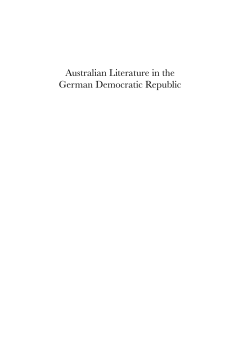
BOOK
Australian Literature in the German Democratic Republic
Nicole Moore | Christina Spittel
(2016)
Additional Information
Book Details
Abstract
An account of fraught and complex cross-cultural literary exchange between two highly distinct - even uniquely opposed - reading contexts, Australian Literature in the German Democratic Republic has resonance for all newly global reckonings of the cultural Cold War. Working from the extraordinary records of the East German publishing and censorship regime, the authors materially track the production and reception of one country’s corpus as envisioned by another. The 90 Australian titles published in the GDR form an alternative canon, revealing a shadowy literary archive that rewrites Australia’s postwar cultural history from behind the iron curtain and illuminates multiple ironies for the GDR as a ‘reading nation’. This book brings together leading German and Australian scholars in the fields of book history, German and Australian cultural history, Australian and postcolonial literatures, and postcolonial and cross-cultural theory, with emerging writers currently navigating between the two cultures.
Nicole Moore is a professor of English at the University of New South Wales and an Australian Research Council Future Fellow.
Christina Spittel is a lecturer in English at the University of New South Wales.
‘This is considered, nuanced scholarship of a high order, [with] surprising and illuminating results, far beyond what might have been thought possible … There are few works of cultural history that offer such a stark and startling dialogic opening-up.’ — Professor Nicholas Jose, University of Adelaide
This wide-ranging collection of essays that explore the construction of the land DownUnder provides interesting insights into political and cultural differences between East and West. The book is particularly rewarding for readers who are interested in cultural exchange in general and in the representation of the capitalist West by the socialist East.'
—Irmtraud Petersson, 'Comparative Literature Studies', Volume 55, Number 1, 2018, pp. 224–229 (Review).
Exploring the imaginative construction of the post-colonial South by the communist East, this is a multi-faceted, collaborative study of the reception of Australian literature in the German Democratic Republic. An account of fraught and complex cross-cultural literary exchange between two highly distinct, even uniquely opposed reading contexts, this study has resonance for all newly global reckonings of the cultural Cold War.
Australian Literature in the German Democratic Republic is an investigative exposé of Australian literature’s revealing career in East Germany. Working from the extraordinary records of the East German publishing and censorship regime, the authors materially track the production and reception of one country’s corpus as envisioned by another. The 90 Australian titles published in the GDR form an alternative canon, revealing a shadowy literary archive that rewrites Australia’s postwar cultural history from behind the iron curtain. Cast as a geo-political conundrum – beautiful and exotic, yet politically retrograde – Australia was presented to East German readers as an impossible, failed utopia, its literature framed through a critique of Antipodean capitalism that yet reveals multiple ironies for that heavily censored, walled-in community.
This book brings together leading German and Australian scholars in the fields of book history, German and Australian cultural history, Australian and postcolonial literatures, and postcolonial and cross-cultural theory, with emerging writers currently navigating between the two cultures.
‘A compelling case study of the cultural Cold War and its effect on literary exchange.’ — Professor Wenche Ommundsen, University of Wollongong
Table of Contents
| Section Title | Page | Action | Price |
|---|---|---|---|
| Front Matter | i | ||
| Half Title | i | ||
| Series | ii | ||
| Title | iii | ||
| Copyright | iv | ||
| Contents | v | ||
| Figures | vii | ||
| Tables | ix | ||
| Acknowledgments | xi | ||
| Chapters | 1 | ||
| Introduction South by East: World Literature’s Cold War Compass | 1 | ||
| Part I Contexts and Frames | 33 | ||
| Chapter 1. Censorship, Australian Literature and Foreign-Language Books in East German Publishing History | 35 | ||
| Chapter 2. Towards a Cross-Border Canon: Marcus Clarke’s For the Term of His Natural Life Behind the Wall | 51 | ||
| Chapter 3. Community, Difference, Context: (Re)reading the Contact Zone | 71 | ||
| Part II Books and Writers | 91 | ||
| Chapter 4. Sedition as Realism: Frank Hardy’s Power without Glory Parts the Iron Curtain | 93 | ||
| Chapter 5. Katharine Susannah Prichard, Dymphna Cusack and ‘Women on the Path of Progress’ | 117 | ||
| Chapter 6. Walter Kaufmann: Walking the Tightrope | 139 | ||
| Chapter 7. Fictionalizing Australia for the GDR: Adventure Writer Joachim Specht | 163 | ||
| Chapter 8. ‘To Do Something for Australian Literature’: Anthologizing Australia for the German Democratic Republic of the 1970s | 187 | ||
| Part III Literary Exchange | 209 | ||
| Chapter 9. ‘There I’m a Nobody; Here I’m a Marxian Writer’: Australian Writers in the East | 211 | ||
| Chapter 10. Behind the Wall, through Australian Eyes: Anna Funder’s Stasiland | 221 | ||
| Chapter 11. ‘Because It Was Exotic, because It Was so Far Away’: Bernhard Scheller in Conversation with Christina Spittel | 239 | ||
| Back Matter | 249 | ||
| Contributors | 249 | ||
| Index | 253 |
